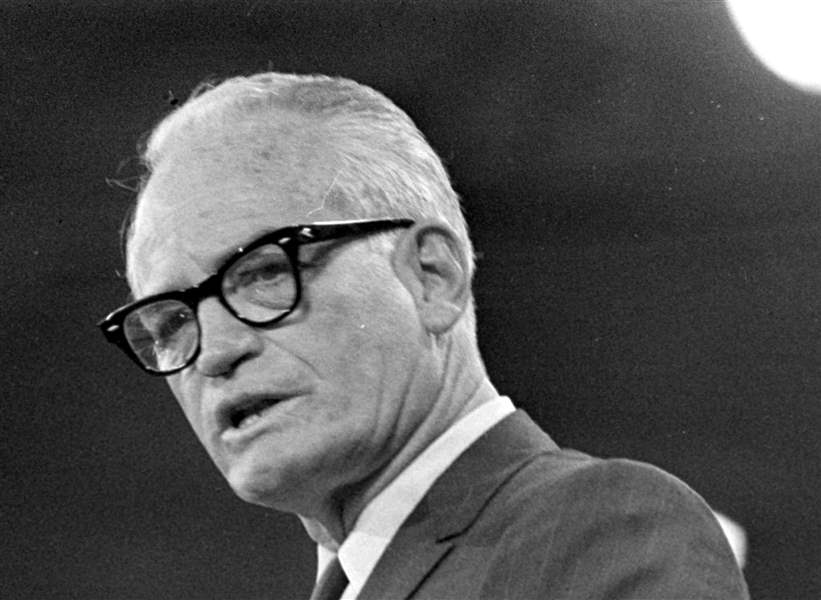
A monument for John McCain
9/1/2018
Barry Goldwater, the long-time U.S. Senator for Arionza and the father of modern American conservatism, was well-known for his maverick-like tendencies.
ASSOCIATED PRESS
That John McCain would be eulogized by the two men who blocked his path to the presidency — George W. Bush and Barack Obama could be seen as a footnote to what Reinhold Niebuhr dubbed “the irony of American history.”
But if it is an irony, it is a fitting one. This is what we should be: A nation in which there is friendship across the party and ideological divide; a nation in which there is mutual respect in spite of political differences; and a nation in which we always have more common faith in the country than divisive pessimism.
I do not believe the death of John McCain represents the passing of an old and better order. I don’t think the nation has lost its mind or its soul. As Mr. McCain said in his last message to the nation: Do not despair. Never despair of America or its institutions.

Keith Burris.
But I do think that two orientations often associated with Mr. McCain are hard to sustain these days and need feeding and watering. One is the stance of the moderate and the other is that of the maverick.
It is very hard to be either one of those things in today’s politics. It’s possible, but it is tough.
They aren’t the same thing, either.
A moderate in politics is one uncomfortable with the ideological extremes and interested, primarily, in the possible — actually passing legislation if he or she is a legislator and actually making forward progress if he or she is a governor. Such a person cares very little about the orthodoxies of either party. Such a person cares about accomplishment.
Mr. McCain was a moderate. When I think of a quintessential moderate in the Senate in the past, I think of Howard Baker or Bob Dole. When I think of one today, I think of Rob Portman. Mr. Dole could be a fierce partisan. But he also worked with George McGovern on nutrition programs for the poor. Mr. Portman may just be the most active legislator in the Senate today. And almost every bill he drafts has a primary Democratic co-sponsor.
When I think of moderate governors, I think of Nelson Rockefeller, James Rhodes of Ohio, and Dick Thornburgh of Pennsylvania. All three were Republicans who were good for public higher education. And Mr. Rhodes cleaned up Lake Erie, among other things. These men were in no way bound by ideology. They were outstanding governors, and they loved the job, because they could get results.
It is easier to be a moderate governor than a moderate senator today, because the things that land on a mayor’s or governor’s desk are inherently practical, and the “proximate solutions” available, to borrow another Niebuhr phrase, are too.
But it is hard to get to the Senate as a moderate, because primary voters, the party core voters, tend to want an ideological fire eater. Mr. McCain, after five terms in the Senate, faced a primary challenge in his sixth and last race. Many in the Arizona GOP didn’t like him very much.
Indeed, at the end of his career, Barry Goldwater, one of the founding fathers of modern American conservatism, was greatly disliked, virtually disowned, by much of the Arizona GOP.
Such is the madness of the puritanical and tribal impulse in politics. What two names are more hallowed in Arizona than Goldwater and McCain? And where would the Arizona GOP be without them?
Now Mr. Goldwater was no moderate. He was an absolute maverick. And he reached a point in his life at which he was going to happily be a party of one — thinking what he thought and saying what he thought, and “to hell,” as he said, with the political consequence. One notable example of his independence was gays in the military. “You don’t have to be straight to shoot straight,” he said.
And yet Mr. Goldwater remained fundamentally and deeply conservative, his guiding principle being “don’t tread on me” — freedom for the individual.
And Mr. McCain remained fundamentally conservative, his guiding principle being service to the republic. He might veer from the party doctrine on immigration, or campaign reform, or health insurance. But his core vision always had to do with what was good for the country, as a whole. Thus, though he was not for Obamacare, he was not for scrapping it unless the alternative was something better. And he was not for a new plan arrived at outside the “regular order” — hearings, debates, and amendments.
That is surely a conservative, and moderate, position.
There are many different way to be conservative. The moderation of an Eisenhower or a Scranton or a Portman is one way. The maverick path of a Goldwater, or a Rand Paul, is another.
Perhaps the greatest maverick ever to serve in the U.S. Senate was Wayne Morse, no conservative and no moderate, but another party of one. He saw the folly of the Vietnam War and spoke out earlier and more courageously than anyone. Mr. Morse was first a Republican, then an independent, and then a Democrat in the Senate.
The great contribution the maverick makes is the Burkean disposition to tell the voters what they may not want to hear — to educate and shape, not just mirror, public opinion.
The moderate helps us to find consensus and what historian Arthur Schlesinger called “the vital center.”
Rather than an office building in Washington, which has been proposed, a fitting and lasting monument to John McCain would be to rebuild the political center, in the Senate and the country, and to listen to and empower the mavericks.
Keith C. Burris is editor and vice president of The Blade, and editorial director for Block Newspapers. Contact him at: kburris@theblade.com or 419-724-6266.